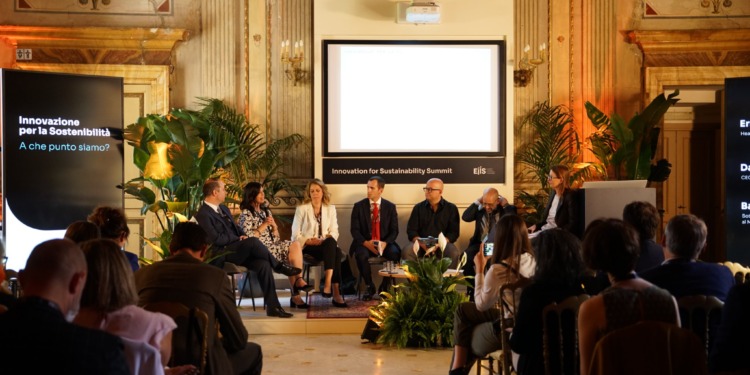Carlo Alberto Pratesi is an author and professor of Marketing, Innovation and Sustainability at the Roma Tre University in Rome, Italy. He began his work as a scientific consultant for Barilla Center for Food and Nutrition Foundation in 2009 and has co-founded InnovAction Lab, which aims to bring talents from universities closer to the startup ecosystem. Additionally, he is an Open Innovation academic advisor of Digital Magics.
His main research areas are food and business sustainability, entrepreneurship and startups as well as corporate communication and marketing. His latest book, “Carbon Neutrality in the Agri-food Sector: Challenges and Opportunities in a Dynamic Setting,” was published in 2021.
Pratesi is also the founder and president of the European Institute of Innovation for Sustainability (EIIS), which provides companies and individuals with the education they need to make sustainable and innovative business decisions.
On April 21-22, EIIS is hosting its European Innovation for Sustainability Summit in Rome, an “international event dedicated to companies and individuals that believe sustainability is achieved by innovative processes, products, and behaviors.”
We spoke to Pratesi ahead of the event to find out more about his work, EIIS, and the EIIS summit.
How did you become interested in sustainability innovation, particularly where food and agriculture are concerned?
Carlo Alberto Pratesi: My professional and academic path started with marketing and communication. Around 2010, my interest in research and education expanded to the topic of innovation. In particular, education for innovation and entrepreneurship, launching an inter-university path to boost the birth of startups. Then, in the same years, I started working for the newly established Barilla Center for Food and Nutrition and I studied the issues of sustainability related to the agri-food chain. Since then, my university course has been called “marketing, innovation and sustainability”: a name that inspired the birth of the European Institute of Innovation for Sustainability.
What is the most innovative and interesting development you have seen recently in the food and agriculture sector?
Carlo Alberto Pratesi: I am very impressed by what Barilla has done in Italy in the soft wheat and durum wheat supply chains, combining agronomic principles of the past with technology and big data management.
What kind of changes do you hope the European Institute of Innovation for Sustainability can inspire? How does your methodology help companies become more sustainable?
Carlo Alberto Pratesi: Our goal is to “connect sustainable minds” because we think that without innovation there will be no sustainability, and without collaboration between many different stakeholders, there will be no innovation. This is why we have launched both training courses (to create a common language) and face-to-face events such as our summit.
The European Innovation for Sustainability Summit encourages companies to implement greener practices through innovative products and practices. What changes would you like to see businesses make to achieve this?
Carlo Alberto Pratesi: Break down the silos within the company (between different departments), along the supply chain (between different players), between supply chains (from the point of view of the circular economy) and between sectors (public, private and third sector).
Related articles: How Local Governments Can Put Food on the Table: An Interview with Peter Defranceschi | Fight Food Systems Failures and Famine: The Four “Fs” | How to Transform Food Systems in the Face of Climate Change | Strengthening Urban Food Systems in Times of Crisis
Could you please share with our readers some of the highlights from your recent book concerning the challenges and opportunities presented by carbon neutrality in agriculture?
Carlo Alberto Pratesi: The book deals with the in-depth study of sustainability issues in the agri-food sector. In particular, a critical analysis of the current situation was developed and the future prospects of the sector on the issue of managing the environmental variable and the impacts relating to food production and consumption have been analysed.
Furthermore, the state of implementation and best practices relating to the carbon neutrality model in the agri-food sector were analysed and models for the development of a new food production system were proposed with particular reference to the reduction of emissions, regeneration of natural resources, the elimination of waste and the reuse of production by-products.
The main objectives of the book are to analyse the current situation and trends regarding carbon neutrality schemes and the connection with other greening programs, to identify and analyse the carbon-related labels, their methodology and their conformity assessment mechanisms, and to understand possible key drivers for carbon neutrality or low-carbon achievements in the agri-food sector.
Today companies are acting on climate change pressures: implementing carbon-neutral strategies for their brands and products. These frontrunner companies have identified a specific competitive advantage and are exploiting it to become the pioneers and the reference model for the carbon-neutral implementation.
The book provides detailed and practical insights into how an organisation can take positive action and be part of the global response in developing a carbon-neutral business.
Editor’s Note: The opinions expressed here by the authors are their own, not those of Impakter.com — In the Featured Photo: European Innovation for Sustainability Summit 2022 – Day 1. Featured Photo Credit: European Institute of Innovation for Sustainability (EIIS).










